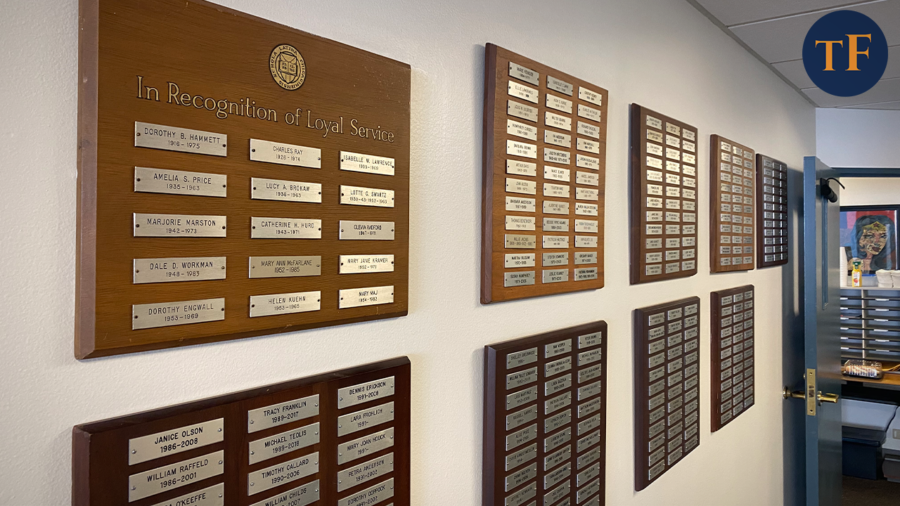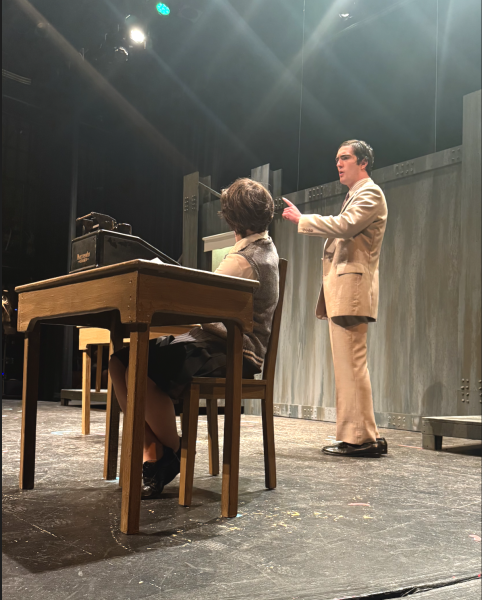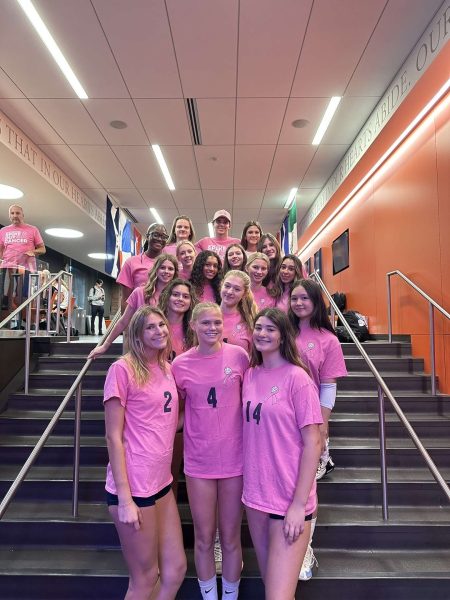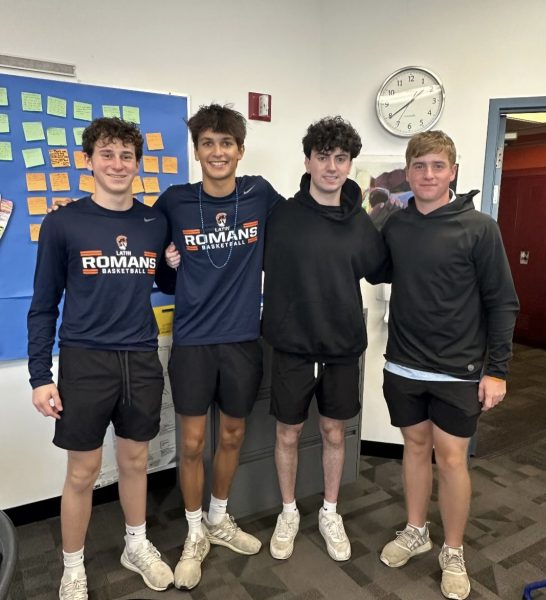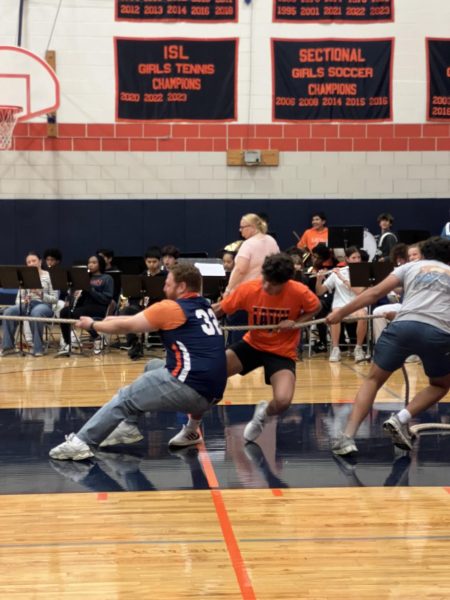Head of School Refuses to Accept Latin Faculty’s Attempt to Unionize
A series of plaques honoring Latin’s most loyal educators lines the second-floor hallway.
As Latin nears the end of perhaps the most challenging year in its 133-year history, the school reached a new level of contentiousness this week as the faculty announced their intention to unionize and Head of School Randall Dunn quickly responded by saying he would oppose this move.
Events boiled over on Tuesday, when Mr. Dunn sent an email notifying families of his refusal to accept a Binding Unit Agreement presented to him by a group of faculty members. In his email, Mr. Dunn stated, “This document is a request that Latin voluntarily recognize a Union to represent all Latin teachers, assistant teachers, department chairs, academic chairs, deans and nurses. It asked that this Union be recognized by Latin as the sole representative for all faculty and instructional staff even though there has not been open discussion regarding its need, long-term effects or individual rights.”
“Our response was to not accept their request to voluntarily recognize the Union because we do not believe it is in the best interest of our students, faculty, staff or our school as a whole.”
So far, according to Upper School history teacher Stephanie Stephens, about two-thirds of the faculty—including herself—are in support of the Union.
On Wednesday morning, the majority shared their intent to form a Latin School Union with the National Labor Relations Board. The group will meet on May 4 to set the election date, which will utilize a secret ballot. For the Union to pass, they will need a simple majority of the votes cast.
Upper School Latin teacher Elissabeth Legendre, a spokesperson for the Union, said that with a Union, the faculty can “use our institutional wisdom and our accumulated expertise to really advocate for all of our students, teaching, learning and student well-being.” She said that this year, “There were times where it felt like the expertise of the faculty, the people who are on the ground, in the room with the students who have been here, working with students for so long, wasn’t being relied upon, that there were decisions that were being made without our voice.”
Upper School science teacher Faye Wells, another spokesperson for the Union, shared similar sentiments. “While we are thankful for the hard work of those top decision makers, our ability to provide quality education should not be so tenuous.”
Upper School English teacher Molly Lemieux, another supporter of the Union, said, “What this year has really highlighted are issues that have been brewing for some time now and are not really new this year, but were just brought to the forefront.” She said she believes that teachers could add an important perspective to decision-making as a Union. “As teachers, as the people who spend so much time with students, if we can have a seat at the table, if we are part of the decision-making process, then ultimately that will benefit students the most.” She also mentioned that unionizing would help move forward diversity, equity, and inclusion initiatives. “Our goal is to make the school environment a place that is inclusive for all and [a place] where the diversity, equity, and inclusion goals are met.” Additionally, “I know, 100%, that the faculty that support the Union aims to work collaboratively with administration and to partner with them to promote the best interest of the community.” A Union, as opposed to the current system of a singular faculty council, would help the faculty fulfill this goal by giving them “a seat at the table in decision-making processes in a way that is legally protected and in a way that truly ensures that not only are we listened to, but we’re actually heard,” she said.
Similarly, Ms. Wells shared “Our values pertaining to DEI as well as teaching excellence naturally line up with having a more full representation of our community in the rooms where decisions about teaching and learning are being made.”
However, Mr. Dunn did not share the faculty’s belief that a Union would improve the school. He said that his initial reaction to the proposal was that “this is not rightful and this is going to corrupt our community in the ways that we’re trying to build, and we have other ways that we can actually address these issues. Every individual has the right to think about a Union. I have respect for the fact that there are places where unions are necessary and the right for people to actually have that option.” Nevertheless, he said he ultimately believes that the “bargaining and stratified way in which [unions] work does not allow us to be nimble and address things on a yearly basis.”
Ms. Legendre, as well as Ms. Stephens and Ms. Lemieux, cited a unified front as a driving benefit of a Union. For Ms. Legendre, the unified front will provide accountability. Ms. Legendre explained that she, as well as any faculty member, can have a robust conversation with Mr. Dunn and the transition team (a group of faculty appointed to temporarily replace former Upper School Director Kirk Greer after he left mid-year). But, as Ms. Legendre explained, they can listen as much as they want, but they don’t necessarily act on things.
She said, “It would not just be my voice being heard, but the whole faculty together, so we can have a stronger voice. We can have a voice that includes everybody.” While she feels comfortable addressing concerns with Mr. Dunn, she said, “Some people don’t feel comfortable going in to talk to Mr. Dunn or the transition team, and so together we can stand to support the entire school community.”
However, Mr. Dunn said he believes that the unified front will be less productive than addressing issues on an individual level. “In terms of building community and solving the school’s issues, the Union frankly is in the middle of that. It gets in the way. We want to build collaboration, be able to have folks communicate directly with us to solve problems. The union would represent the collective and not the individual.” He added, “We pride ourselves in our ability to be able to address our community, our faculty, directly rather than through another entity.” Latin already has “a faculty council that serves as essentially the body that we can do this work around,” he said. “So bringing in a third party is not necessary.”
Mr. Dunn said that his aversion to a union at Latin is motivated, in part, by his past negative experiences with unionization. “I just know that, in my experience in this world around unions, it can divide the community, and I’m trying to work on ‘union’ in a way that brings us together, not one that gets in the way,” he added.
For Ms. Stephens, a Union is about preserving the benefits that drew her to Latin in the first place. She noted that when she was hired 23 years ago, Latin invested in her as a teacher by covering the full cost of her master’s degree and offered her 100% tuition remission when she had kids. She said she appreciated the many benefits, such as a generous maternity leave, small classes, lots of support, and professional development. “That is what helped attract excellent teachers and it made Latin a nationally renowned school,” she said.
Recently, she has seen those benefits slowly wither away. Instead of Latin covering 100% of tuition remission as they did for her, the tuition remission policy is now 85% coverage for faculty and staff who started work at Latin before July 1, 2018, and 75% coverage for faculty and staff who started work at Latin on or after July 1, 2018.
Ms. Stephens credits her tuition remission as what “made Latin a standout school and in an exceptional kind of way.” But when the school reduced the tuition remission, “That was a pretty severe blow, and I did not get to be a part of that conversation except to say, ‘This is really going to have a damaging impact.’”
In response, Katie O’Dea, the Director of Communications and Strategic Initiatives at Latin, noted some of the school’s existing benefits. “Up to $4,000/year can be awarded to benefits-eligible faculty, staff and administrators wishing to enroll in a job-related program of study from an accredited institution.” Additionally, “Lower school assistant teachers are entitled to a $3,000/year educational grant during each of their three years of employment to assist them in earning a master’s degree. It varies from year to year, but Latin regularly contributes close to $80,000 annually to teachers and assistant teachers through Educational Grants.”
She also explained Latin’s commitment to professional development opportunities, “For example, in 2018-19 (our last pre-COVID year) Latin invested $499,000 in faculty professional development. Latin benchmarks this amount with 50 peer schools across the country and currently ranks #4 in terms of our level of investment in this priority.”
Ms. Stephens said she feels she has seen the faculty benefits decay in an arbitrary manner, one in which the faculty had no say. If there is no Union, this pattern could continue. “My goal is to protect what we do have,” she said, “and I want to acknowledge that we do have a lot of really wonderful benefits still. I just really feel like what makes teaching here wonderful is when you don’t have to worry about your contract changing dramatically. And so I want to protect those benefits for the next generation of teachers.”
Ms. Stephens, Ms. Legendre, and Ms. Lemieux all emphasized that the Union is not a reaction to the pandemic. Rather, the pandemic brought longstanding issues to light. Ms. Stephens said, “Even before the pandemic, as the school has expanded, I feel like the faculty voice and influence on decision-making has diminished.” Additionally, Ms. Wells shared, “Because of the unusual and unprecedented circumstances, we got a chance to see our community go through a proverbial stress test. Just like any good stress test, it showed where our weaknesses were as a school, as a community. We need to move forward, heal, and improve on some of those stress fractures.”
However, Mr. Dunn said, “This has been such a hard year on everyone and [we] ought not to let this year define this school, and this situation [establishing a Union] will essentially do just that.”
Mr. Dunn hears these concerns over representation in decision-making and wants to “have a full conversation about that.” However, he says, “We’ve been separated this entire year as a community. And therefore, to go this route before engaging together as a community is patently unfair and inappropriate.”
“If we are a community, and we have been in our silos all year, it’s impacted everyone, and to make a drastic decision that changes the culture of our school without relying on each other for support when we are back together is unfair to a lot of people because no one has had a chance to really engage around this,” he said.
In terms of how a Union would change the culture at Latin, Ms. Stephens believes that faculty will “be able to participate as equals in these discussions with either major policy changes or contract changes.”
In contrast, Mr. Dunn believes that with a Union, “We will now need to bargain and create sides in a bargaining atmosphere around things like contract and benefits and a number of things that have been shared at the school where we’ve been transparent about a lot of those processes. Now a third party steps into the role of doing a number of those things on behalf of our faculty.”
“We want to be personal and collaborative. We really work to be inclusive in these processes and I think the mechanics of unionization prohibits us from doing a number of those things,” he said.
Ms. Wells said, “Change is hard, and feelings are real. So I am conflicted by how this feels right now, as some disagree with our efforts. However, I feel that in the long run, this is a big step in the right direction to attract and maintain the very best educators for our exceptional students.”
“Ultimately,” Ms. Wells added, “most of us really love Latin and want to see it be the best it can be. It seems natural to create systems that will streamline efficiency, efficacy, communication and implementation of initiatives and changes to our programs.”
The Chicago Public Schools have a teachers union. Two of Latin’s closest independent school peers in the city—Francis W. Parker and the University of Chicago Laboratory Schools—have a union as well. Should Latin be next? Mr. Dunn stressed that Latin is not like those other schools. “I believe we’re the Latin School of Chicago. We are Romans. We have creativity in a way to work together to solve significant issues. We’ve done it in the past. I want an opportunity for us to do it now.”
The Lab School, Parker, and CPS did not return in-person this year to the extent that Latin did, showing a correlation between a lack of in-person learning during the pandemic and the existence of unions. For students and families who have wanted school to be in-person, this correlation raises the question of whether unions are truly in the best interest of students. Proponents of the movement to establish a union at Latin argue, however, that the existence of a union would benefit students, so this issue of the impact of a faculty union on the student experience at Latin will be important as the Latin community debates the advantages and disadvantages of unionization.
However the debate plays out this spring, it is evident that the physical separation of the past year has exposed a significant rift in the Latin community. Will the arguably unavoidable “us versus them” mentality that comes with unions tarnish the rebuilding of the Latin community following an incomprehensibly burdensome year? Or will a union give faculty an equal seat at the table, protections they feel they need, and a renewed sense of belonging?

Ashna has been writing for The Forum since freshman year, and it remains one of her favorite activities. She also enjoys working out, making...

Peter Jones (‘21) is a senior at Latin and is ecstatic to be serving as Editor-In-Chief for his second consecutive year. The Forum means everything...















































